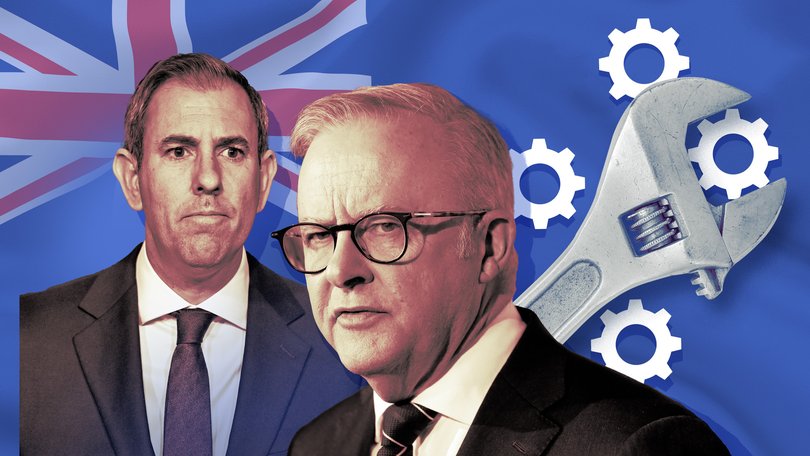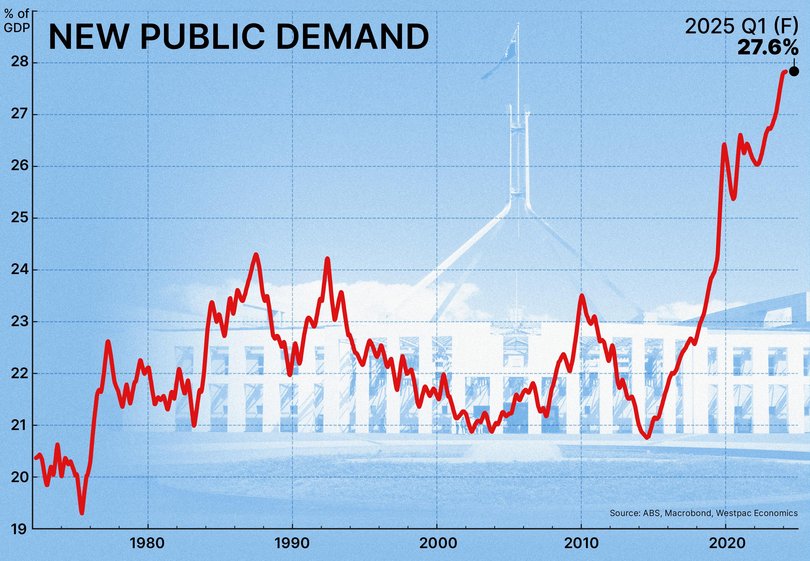AARON PATRICK: Jim Chalmers’ lobbyist summit will ignore Australia’s greatest problem: government
AARON PATRICK: Government has never been this pervasive in the modern age, strangling innovation, enterprise and ambition. The problem may barely be mentioned this week in Canberra.

From privileged seats around the cabinet table, lobbyists, unionists and policy exerts will press their pet projects upon Treasurer Jim Chalmers over the next three days. But the problem at the heart of the economy — the one strangling innovation, enterprise and ambition — may barely be mentioned.
In the modern age, government in Australia has never been this pervasive. Spending by federal, state and local authorities will hit a record 27.6 per cent of the economy in the current three-month period, according to forecasts from Westpac Bank.
This represents one of the greatest expansions of government economic interference in Australian history. Back in 2016, when Liberal Malcolm Turnbull was prime minister, all-government spending was 21 per cent. Under Gough Whitlam’s Labor government in the 1970s — long considered the standard for left-wing economic intervention — it was almost as low as 19 per cent.
Sign up to The Nightly's newsletters.
Get the first look at the digital newspaper, curated daily stories and breaking headlines delivered to your inbox.
By continuing you agree to our Terms and Privacy Policy.Changing the conversation
Anthony Albanese and Jim Chalmers have mostly avoided discussing government spending ahead of their economic reform “roundtable”. Instead, they have emphasised potential regulation reductions for building homes and opening new factories and mines.
They must know big budgets pose a serious, long-term challenge for Australia. Having won a huge majority by opening the spigots of the federal Treasury, the Prime Minister and Treasurer are struggling to pay for programs such as the National Disability Insurance Scheme, which overpays for services once considered family responsibilities, including zoo visits for mildly autistic teenagers.
Thanks to the NDIS and other social programs, taxation is not keeping up with spending, and the federal budget will be in deficit for the foreseeable future. Eventually, without great luck, Australians have to pay.
Australians’ attitudes towards the problem are a paradox. Fifty-seven per cent regard raising taxes as the worst outcome, according to a Newspoll published Monday, while 27 per cent see cutting spending as the worst way to balance the budget.
The poll suggests Australians are economically conservative. Even 51 per cent of Labor voters would prefer programs to be cut rather than taxes go up.
But at this year’s election they voted overwhelmingly for big government. The Labor Party promised to expand welfare across the nation. Voters said: “Yes, thanks”.
Humility and greatness
Navigating the dual personalities of the Australian voter is a challenge the opposition has failed at.
Some Coalition figures wonder why their Treasury spokesman, Ted O’Brien, has accepted the Government’s invitation to this week’s meetings.
His presence may be seen as endorsement of the process, which Dr Chalmers has deftly presented as offering solutions to Australia’s big problems, while being just one of many of steps he takes while leading the nation to even greater prosperity.
“I have realistic expectations about the next few days, but I’m optimistic as well,” he said Monday, a statement that suggests a combination of humility and greatness.

His confidence is understandable. On Monday, the Newspoll showed the Coalition not even close to the Government’s popularity, and the Prime Minister back in positive territory. On the current trajectory, at least six years of Labor power looks likely, providing Dr Chalmers ample time to become prime minister himself.
The Treasurer suggested ideas from the meetings would be considered in the budgets announced each May, which are the normal venue for big policy decisions. “This is all about three days to inform the next three budgets and beyond and I am really looking forward to it,” he said.
Cabinet room charade
The next budget is due in nine months. Every group in the cabinet room this week is likely to make a pre-budget submission, as they always do. Unless Mr Albanese and Dr Chalmers have specific changes they want made, why go through the cabinet room charade?
Which suggests the meetings are a play to which the ending has already been written. Can Dr Chalmers pull off a satisfying climax for the audience? Australians will soon found out.
On Sunday, he and Mr Albanese made what may have been an accidental reference to one of Australia’s other great political actors. ”When you think about the big changes under way in the world,” they wrote for News.com.au, “there is nowhere else you’d rather be than right here in Australia.”
In 2015, Mr Turnbull, then prime minister, said: “This is the most exciting time to be an Australian and there is no more exciting place in the world than Australia.”
That’s true, if you make a living from government. For those funding government through their taxes, Australian policy making is about as exciting as a mid-day sit-com.

